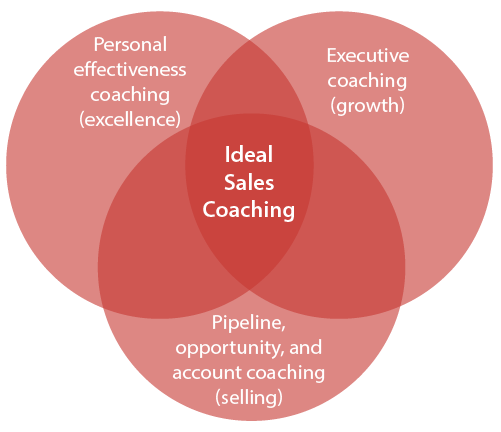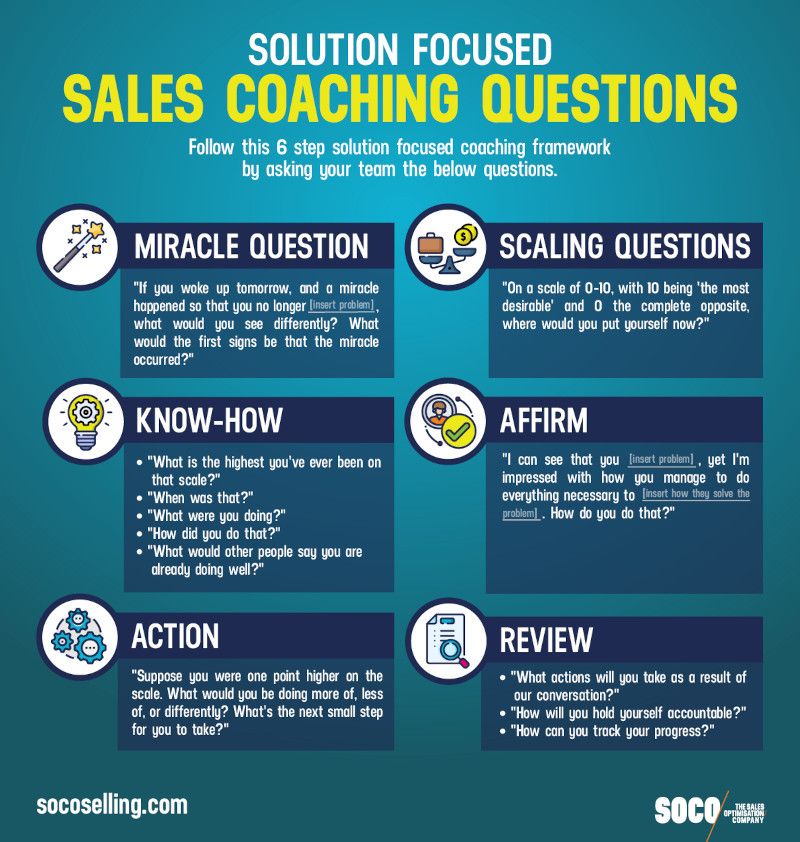A good sales coaching program has the potential to drive up sales and transform an organization for the better.
But, its effectiveness depends on two factors. One is the salesperson's willingness to learn. The second factor lies in you — and how empowered you are as a sales leader to improve your team's performance.
What is sales coaching?
Sales coaching is an important part of sales enablement that involves evaluating and mentoring a salesperson (ideally one-on-one) to improve performance.
Coaching is not the same as managing and telling your team what to do, but rather:
- developing the skills of your salespeople;
- guiding your team to discover how to their goals;
- maximizing sales rep performance.
If you're doing your job right, all these efforts should eventually lead to greater sales and revenue.
According to RAIN Group, the ideal sales coaching strategy is the intersection of three areas:
- Personal effectiveness coaching;
- Executive coaching;
- Pipeline coaching.

We've collected some useful strategies to help you develop, train and mentor your salespeople and help them reach their full potential.
1. Act the way that you want your sales team to act
Nobody follows a leader who’s all talk and no action. Showing how a leader operates is a great way to transfer some leadership skills to your team members. If you exemplify the virtues, characteristics, and qualities you seek from your sales team, you will earn their respect.
Many praiseworthy salespeople have exceptional knowledge of what they offer. They are also empathetic, confident, and optimistic. If you want to work with people who have these traits, embody these traits, too.
Here are some of the ways you can demonstrate leadership to your team:
- Radiate positivity and take proactive approaches — Encourage people to be their best versions. Also, be a thought leader and earn an authoritative reputation.
- Focus on long-term goals — Set aside minor inconveniences when making decisions. While small victories can boost morale, avoid losing sight of the more essential organizational goals.
- Actively listen — Get ideas and see things with a fresh perspective. And as you observe other people, learn and embrace changes.
2. Train rigorously
If your team doesn’t know the first thing about selling, it’s unrealistic of you to expect them to close a sale. This is where sales training enters the picture.
The goal of training your employees is to enhance their selling abilities to the point that these abilities come naturally to them. Without proper training, they are more likely to panic, mention inappropriate data, and mishandle customers.
Here are some of the ways to train your salespeople:
- Leverage purchase intent — Understand your target audience and optimize your content to match what they want. To do that, use retargeting, shoppable posts, website analytics, and more.
- Let them use the shadowing method — Ask an experienced salesperson to show them how to accomplish the job. The idea is to let them observe a seasoned salesperson conduct an average sales call.
- Build a communication process — Provide your salespeople with the necessary information about their prospects and give them a better idea of how to convert them into buyers.
3. Use feedback as data to empower your sales
Customer and user feedback is a valuable tool to help you uncover insights about your team’s performance. It enables you to make fundamental changes in your sales organization.
There are many ways to collect feedback, like distributing Salesforce surveys and sending emails. You can also conduct one-on-one interviews, asking individuals for thoughts on how the sales process can improve.
Here are some of the ways to interpret feedback to help your team:
- Provide personalized input for outreach — Understand someone’s digital body language. Then, use this data to create a personalized sales plan. The idea is to address pain points and offer unique solutions.
- Focus on helping others — Emphasize the benefits of your offer. Using the data you have on customer pain points, present the benefits in a way that makes life easier for the customers.
- Initiate a multichannel selling strategy — Find out information about the channels where your audience engages with you the most. Then you can turn those channels into touchpoints where people can purchase your products.

4. Conduct assessments periodically
If you’re trying to scale up, you may be focusing on administrative tasks — causing you to neglect the performance of your sales team. But ignoring your sales team can result in a variety of performance issues.
Prioritize setting aside time to review your team’s performance. It helps you identify inefficiencies and learn about areas to optimize. From here, you can apply changes and encourage your team to get better.
Here are some of the ways to generate productive and positive employee assessments:
- Structure two-way performance reviews — Let salespeople chime in when you weigh their performance. Ask them what they think of their performance and what they believe are their strengths. After their self-evaluation, add your input and provide suggestions. Then, use all the data to sharpen their selling techniques and abilities.
- Use meeting management software — Schedule meetings with your team. To make them more effective, use a tool with productivity features like agenda-building, timers, note-taking, and decision-tracking.
- Assign partners — Team them up with members and observe their performance. Then, interview their partner to ask about them.
5. Acknowledge great work
Reward your best-performing employees to show everyone you appreciate their efforts. Letting hard workers know that hard work will never go unacknowledged is one of the best ways to motivate your team.
A simple pat on the back may work. Your team may also appreciate it if you get creative. Either way, acknowledge great work. It encourages your team to keep doing their best.
Here are some of the ways to reward sales employees:
- Give continual positive feedback — Laud them for their excellent work without making them feel like it’s on your to-do list. Doing it in a spur-of-the-moment exchange is a suggestion.
- Use a point-based system — Allocate points to each task and provide rewards that people can redeem with points. When a member accomplishes this task, they win a point. Then, the more points they accumulate, the better their reward is.
- Let them earn small wins — Give them tasks you know they will crush. It triggers pride and builds their confidence. It also brings a sense of accomplishment and inspires them to achieve new goals.
Conclusion
Be sure to provide additional resources and ongoing training. You can also point them toward relevant online articles, webinars, and podcasts.
Giving them limitless opportunities to be better salespeople encourages them to perform better.
Not only is it an incredible motivator, but it also results in higher productivity, greater job satisfaction, and superior service. Plus, it gives them a competitive advantage.




